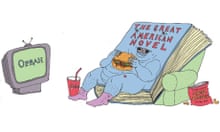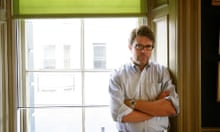Last month, Jonathan Franzen became the first author in a decade to appear on the cover of Time magazine. Over a shot of him looking characteristically serious appeared the words "Great American Novelist".
In his famous Harper's essay of 1996, Franzen had bemoaned the magazine's lack of literary pin-ups as evidence of the declining importance of serious fiction, so you might think he'd be in celebratory mood. Being Franzen, he isn't comfortable with the label. "It paints a big bullseye on the back of my head," he says. "I always hated the expression anyway, mostly because I encountered it in stupid or sneering contexts."
He switches to a high-pitched mocking tone: "Still working on the Great American Novel?" Then adopts the barrel voice of a dunce: "I'm thinking of taking a year off to go to France and write a Great American Novel."
The sneering began after Franzen expressed misgivings over the selection of his last novel, The Corrections, for the Oprah Winfrey book club, in 2001. It sold nearly 3m copies and established Franzen as one of the leading literary voices of his generation, but, thanks to his perceived snub to Winfrey, it also established his reputation as, variously, an "ego-blinded snob" (Boston Globe), a "pompous prick" (Newsweek) and a "spoiled, whiny little brat" (Chicago Tribune).
The fallout set back his writing by more than a year. This time, Franzen has toughened up. "Whatever happens," he says, of his new novel Freedom, "it's not going to get to me. It's just not."
In fact, the novel, which took nine years to write, has had an ecstatic reception by anyone's standards. The Economist likened the book to Paradise Lost, while Sam Tanenhaus of the New York Times said it was a masterpiece of American fiction. Barack Obama even read an early copy on his holiday in Martha's Vineyard. "It must be getting past 50," Franzen says. "I must be nearing the end of my productive career. People are starting to approve."
We meet in Franzen's spartan writing studio in New York's Upper East Side. The tiny room, furnished with a battered old desk and greasy-looking mattress, resembles a monastic cell. The walls are bare except for a single decorative plate. There is a tiny kitchen with one small saucepan.
There is nothing rock'n'roll about Franzen, none of the champagne book launches or late-night escapades that mark the careers of, say, Jay McInerney or Bret Easton Ellis. Compared with them, Franzen comes across as serious, professorial. When I bring up the recent "Franzenfreude" debate, a term coined by author Jennifer Weiner to describe "taking pain in the multiple and copious reviews being showered on Jonathan Franzen", he agrees with Weiner and author Jodi Picoult about the favouritism shown towards "white male literary darlings".
"The categories by which we value fiction are skewed male, and this creates a very destructive disconnect between the critical establishment and the predominantly female readership of novels," he says. "That's inarguable."
When talking, Franzen pauses to compose his sentences, sighing deeply. He rolls up his sleeves, scratches his arm, takes off his glasses and studies them, then looks into the middle distance. In his thoughtful demeanour seems to be an implicit criticism of the vapidity of today's world. The challenge to seriousness posed by technology, for example, has long been a bugbear, and is voiced by one of Freedom's central characters: "'This was what was keeping me awake at night,' Walter said. 'This fragmentation. Because it's the same problem everywhere. It's like the internet, or cable TV – there's never any centre, there's no communal agreement, there's just a trillion bits of distracting noise… All the real things, the authentic things, the honest things, are dying off.'"
On Franzen's desk sit a pair of earplugs that he wears when he writes, over which he places noise-cancelling headphones that pipe "pink noise" – white noise at lower frequency. His computer has had its card removed, so he cannot be tempted by computer games. The ethernet port has been physically sealed, so he can't connect to the internet. While writing The Corrections, he even wore a blindfold as he touch-typed.
Franzen has written four novels, and each involved an epic struggle. The Twenty-Seventh City (1988) took him six years to write, Strong Motion (1992) five, The Corrections (2001) seven and Freedom almost a decade. Compared with the late John Updike or Philip Roth, who wrote books with conveyor-belt regularity, Franzen seems agonisingly blocked. What's his problem?
Franzen pauses and lets out a sigh. "Every time I start a novel, I feel I've never written one before," he says. "That was true the first time, and it's felt true every time since."
Pause, sigh. "I take a certain amount of pride in not being a professional novelist, in apparently being a lifelong amateur. I don't want to be slick."
It isn't just that the latest novel took nine years to finish. It is also that, within that period, only a little over a year was spent actually writing it. He looks back on that year with something approaching joy. "Most of those months were heaven. I was miserable much of the time, but miserable in the happiest way."
If being miserable in a happy way is his idea of heaven, imagine what the first wordless eight years were like. "I was drained by the time I'd done The Corrections. The tank was empty. In 2002, when I tried to get going on a new novel, just meagre little shreds would come out that mostly reminded me of bad Franzen."
The Oprah furore that hit soon after has finally, nine years later, had its resolution. Last week Oprah had the grace to adopt Freedom as one of her book club titles, calling it "a masterpiece". For his part, Franzen has had the sense to keep quiet about it. The whipping he received over The Corrections was his first experience of being publicly reviled, and he blames it on the prevailing mood of philistinism. "A mild problem between me and Oprah was seized upon by a culture that Republicans had whipped into a frenzy on the subject of elitism versus populism. It's very hard to find a self-declared elitist; I certainly wasn't one. But I looked more like one than anyone who was handy at the time."
More than a year later, when he finally felt ready to try his hand at fiction again, he began an agonising trawl for new material. He leaps up from his chair and opens the desk drawer to reveal a pile of what must be at least 1,000 pages of typed manuscript. "All false starts," he says with a strained smile. "It was so pathetic. Notes going round and round in circles. Days spent asking questions about certain characters in certain situations, trying to work out chronologies, logic trees burnishing off into infinity. Horrible, unreadable, intensely boring stuff."
In 2007, he sold a proposal for a short comic novel that would be written in the first person. He signed up to an optimistic delivery date of 10 months and, because his writing cell wasn't quite ascetic enough, decamped to Berlin to write in complete isolation. "I was hellbent on hammering out that book in eight months. Three months later I decided to set aside all fiction writing for a year."
Did he ever think, during those eight years, that his fourth novel might never happen? "Oh sure. Weekly, if not daily. 'I'm washed up as a writer,' that sort of thing."
There was no eureka moment, no point at which the story of the Berglund family suddenly presented itself to him. The character of Patty came fairly early on, from a fragment of a suburban woman's autobiography that hadn't made it into The Corrections, and from there the book began to take shape.
Freedom tells the story of Patty, her environmentalist husband Walter, and their children Jessica and Joey, an ostensibly happy American family who begin to fall apart. Patty is unsatisfied with the devoted Walter and lusts after his best friend, a hyper-sexed rocker called Richard, while smothering Joey with so much love her son feels obliged to rebel. Franzen tried setting it in New York, then Washington, but eventually reverted once more to his own home soil, the midwest. Patty makes a similar journey to Franzen's own – from Chicago, where he was born, and St Louis, where he grew up, to New York – but in reverse.
"I've written four novels about midwestern families," Franzen says. "That's all I've written. Maybe I'm doomed as a novelist never to do anything but stories of midwestern families."
Despite this recurring theme, and though he has been in two long-term relationships – both with fellow writers, first with Valerie Cornell to whom he was married for 14 years, and now with Kathryn Chetkovich – Franzen does not have children himself. In Freedom, Walter embarks on a mission to persuade young Americans to have fewer children. On the subject of his own childlessness, Franzen will say only that overpopulation is a problem he is "not unaware of"; though when commenting on others' reactions to it, he points out that, "given a world of rather strikingly finite resources and a rather inflated and already unsustainable population, it's an interesting thing to call a childless person selfish".
As the novel developed, he says, he realised what he really wanted to write about were the no-go areas of his life; issues he had been avoiding for the past 25 years.
Like what?
"I don't really like to talk about it, but the mother and son stuff in Freedom, and the dynamics of the long marriage, and the shame and guilt associated with those very primary experiences. I got married when I had just turned 23. Both shame and guilt on my own behalf, and a deep wish to protect private third parties, made that really unwritable stuff. Much of the unseen work in the book was overcoming resistance to writing about unwritable material."
That sounds like therapy.
"I didn't mean it as a therapy. But to say that you have been changed by the work on a book – by the process of getting the book to be writable – is not bad. In fact, if a writer can't say that, I have a suspicion it's not a book I want to read."
He makes me underline that comment. "I feel I really said something I meant when I said that."
In that case, how did Freedom change him?
His expression darkens. Another long pause.
"I can't, I won't answer most of that question, because some of the things are so personal. To take a very mild example, one of my projects with the book was to try and imagine what my parents' life would have been like if they had been my age. That may be a natural process that has nothing to do with writing, but I have lost not only the last traces of anger at my mother, but also the capacity to remember why I was so angry."
It took an unexpected tragedy to get Franzen finally writing again: in September 2008, David Foster Wallace killed himself. To say the two writers had been close would be to underplay the importance of their friendship. Franzen says there were aspects of the novelist's life – the interplay of ambition and self-consciousness – that he would discuss with nobody else. When Foster Wallace died, Franzen was overcome not by sadness but by fury. "I was mad. I was mad. I got motivated by anger at him. 'Well, goddamn it, Dave! I've got one advantage over you, and that's that I'm still alive, and I'm going to show what I can do.' "
He plunged himself into what he calls the "forgetfulness of writing". "I was finally flying through the chapters. I would come home at two o'clock in the afternoon after five or six hours of solid concentration, and would just sit in a chair for half an hour and feel, 'I don't owe anybody anything and I don't have to feel bad today because I just wrote 1,200 words.' And that's a great feeling."
This time, he says, "I was very conscious of being done with satire, of no longer having an interest in wowing the reader with every sentence. I was trying to forget for a while – forget glittery, bejewelled writing, forget modernism, forget postmodernism – let's just be with these four people."
The novel may have been hailed a masterpiece, but Franzen's ambition, he says, was simply to create characters that would engage the reader's sympathy; all the language had to be was "adequate" to that task. "I can't stress enough how that word was the rallying cry. Make it adequate! I didn't want to bore the reader, but all it had to be was OK. It didn't have to be great."
Franzen has now embarked on a seven-week book tour, so it will be a while before he settles down to another bout of writing. This time, we may not have to wait another nine years. His fantasy for novel five, he says, is the Stendhal method of book-writing. The great French novelist spent years adventuring around the world, before returning and, in just 53 days, dictating The Charterhouse Of Parma.
In the meantime, he is promoting his latest book, whose title, Freedom – a word with an almost biblical place in the American vocabulary – is the one subject Franzen refuses to discuss. "The significance of the word in the book? Not going to touch it. I made a vow not to talk about it. I feel like, 'There it is, reader, you think about it!' "
All he will say is that the title shouldn't be taken literally. "Unless you hear it ironically, it's a tremendously pompous title," he says. Then again, with almost violent emphasis, "You must hear it ironically."








